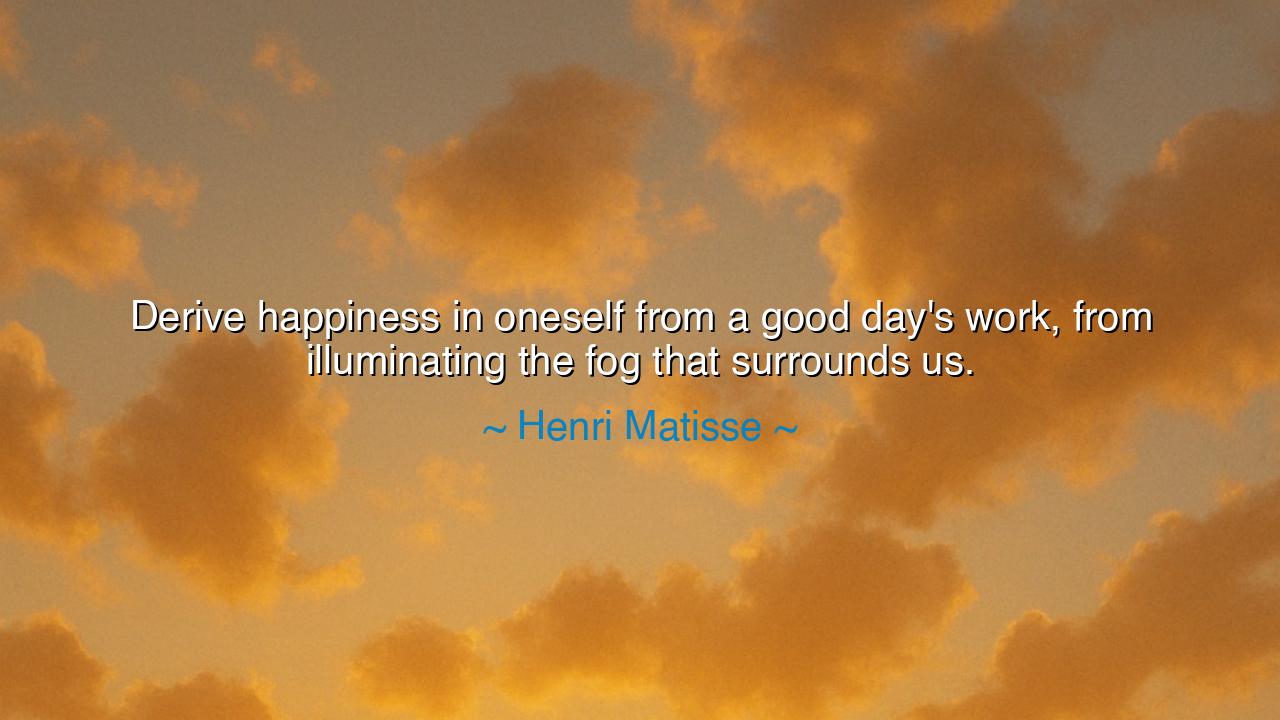
Derive happiness in oneself from a good day's work, from
Derive happiness in oneself from a good day's work, from illuminating the fog that surrounds us.






The painter Henri Matisse, master of color and light, once uttered these timeless words: “Derive happiness in oneself from a good day’s work, from illuminating the fog that surrounds us.” In this simple yet profound statement lies the essence of the human calling — the eternal struggle to bring clarity, beauty, and meaning out of confusion. To illuminate the fog is not merely to work, but to labor with purpose, to pierce through ignorance and uncertainty with the steady flame of one’s own spirit. Matisse speaks not as an artist alone, but as a sage of life, teaching that true happiness is not a gift given from without, but a light kindled from within.
These words were born in the soul of a man who knew both hardship and transcendence. Matisse painted through illness, through the storms of war, and through years when the world seemed dim and heavy. Yet his brush never ceased to move, his colors never dulled. In his later years, confined to a bed and unable to stand before the canvas, he took to cutting shapes of color with scissors, creating his famous paper cut-outs. Through that act of endurance, he lived the very wisdom he preached — finding joy not in what was easy, but in the honest labor of illumination, in continuing to create beauty even as darkness pressed close around him. His art became not only a triumph of skill, but of the human soul’s resilience.
To the ancients, such labor was sacred. The Greeks called it ergon, the noble work through which the soul expresses its divine purpose. For them, to work well was to live rightly. The fog that Matisse speaks of is the fog of confusion, despair, and doubt that settles over every human life. It is the murk of routine, of endless noise, of shallow pleasures that numb rather than nourish. To illuminate this fog is the task of every soul — whether through art, compassion, study, or service. The reward of such illumination is not fame or fortune, but a deep and steady happiness born of purpose.
Consider the example of Florence Nightingale, the Lady with the Lamp. Amidst the filth and suffering of the Crimean War, she did not look for joy in leisure or praise, but in the good work of healing, in bringing order and light into a place of death and despair. She too illuminated the fog — not with paint or words, but with courage, diligence, and love. Her happiness was not loud or fleeting; it was quiet, like the glow of a lamp in a dark field. Such is the happiness Matisse describes — the joy that comes when we have done something to make the world, even in a small way, clearer and kinder than it was before.
In this way, Matisse reminds us that work is not a burden but a blessing. It is the means through which the human spirit communes with creation. To work well is to enter into harmony with the universe, to become a participant in the great act of shaping order from chaos. The one who finds contentment in a good day’s work knows a happiness that no wealth can buy. For when the day is done, and one looks upon what one has built, written, tended, or repaired — there is peace. It is the peace that comes not from rest, but from meaning.
And yet, the world today tempts us to seek joy in idleness, to consume rather than create, to chase shadows instead of light. But those who live this way remain restless, because they have forgotten the truth that happiness is an act, not a prize. To live as Matisse taught is to wake each day with the intent to make the world a little brighter — to think, to serve, to love, to create. When the fog gathers — as it always will — do not curse it. Pick up your tools, your pen, your heart, and set to work. Each stroke of effort becomes a ray of light that pushes back the mist.
Thus, my children, remember this: happiness and purpose are twins born of labor. To seek happiness without work is to seek sunlight without dawn. Let your joy rise from what you have done with integrity and love. Illuminate the fog that clouds your life — not only for yourself, but for others who walk beside you. For in doing so, you become like Matisse himself: a bringer of light, a quiet warrior against the darkness, and a soul who knows the sacred sweetness of a good day’s work.






AAdministratorAdministrator
Welcome, honored guests. Please leave a comment, we will respond soon